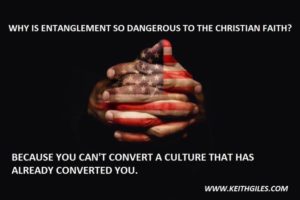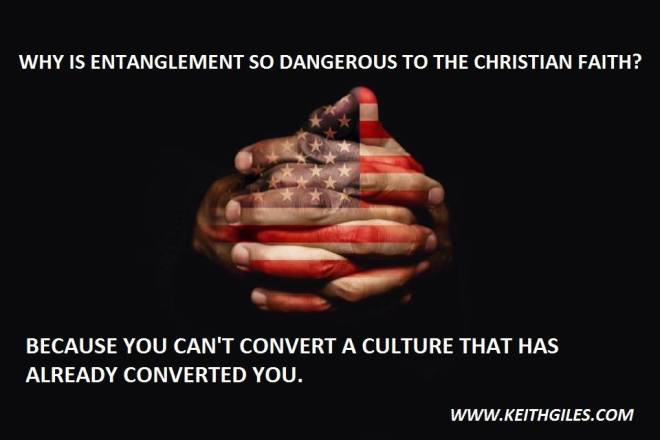
Untangling Jesus Gets Tangled
A Good Read
I must begin my review of Untangling Jesus: Crucifying Our Politics to Pledge Allegiance to the Lamb, Keith Giles, (Quoir, Orange, California, 2017) with the confession that I have a love/dislike relationship with this book. First, allow me to say what I love about this book.
Keith Giles makes an insightful, well-articulated argument concerning the relationship between Christians and American society. The truth that Giles uncovers and the premise of his book is that Christians have sold out to secular America. Giles points to the fact that the terms “Christian” and “American” are almost synonymous. People identify the United States as a Christian nation. It can be argued, however, that it does not follow the teachings of Jesus. To these points we can add the fact that, on the whole, individual Christians are more focused on the American Dream than on being faithful, obedient followers of Jesus. All of this underscores the need we have to start untangling Jesus and his gospel of love and grace from the American gospel of individualism, materialism and power. I couldn’t agree more with the premise of Giles’ book.
In Untangling Jesus, Giles does more than simply take pot shots at the Moral Majority and Religious Right. He backs up his argument with historical summaries of the Church Fathers, Emperor Constantine’s influence on the church and the Reformation, along with observations on our political process and sociological forces. All of this is done in a clear, forceful writing style that captures the reader’s attention and pulls him or her into the fray of untangling Jesus. This is a good, thought provoking book and I encourage you to purchase it, even though, in my opinion, it has some weaknesses.
Some Criticisms
I’m a Lutheran pastor. Giles casts his heroes, the Anabaptists (forerunners of the Baptists and non-denominationals) as the champions of the movement against political entanglements. Giles views the Reformers as the bad guys. Intentional or not the books casts the mainstream desendents of the Reformers in the same light. It is true that the Anabaptists did not have the support of those in power. It is also true that the Reformers harshly opposed them. Still, there were several forces at work during the Reformation. To see the conflict between the Anabaptists and Reformers as “good guy vs. bad guy” is too simplistic.
If I understand Giles correctly, he advocates for a total separation of Christians from politics. We can agree that God moves predominately through the church. God also uses the political arena to accomplish his will, though. Christians can and should be involved as long as they do not entangle themselves in the non-Christian culture forget who they are.
The book is written from a conservative Christian perspective. Liberal and mainline Christians are mostly not included in Giles illustrations or arguments. When liberals are mentioned, as in the controversy over abortion, they are not seen as part of the church. They are instead understood to be the enemy.
Giles advocates that Christianity should become a sacral society. A common religious loyalty binds this society together. I think there is too much diversity in the church, though. We have allowed our differences to outweigh our unity found in “One Lord, One Faith, One Baptism.” Skeptic that I am, I’m not sure that Christianity in the United States could ever become a sacral society.
A Final Opinion
Untangling Jesus, is not a perfect book, but it is a good read. It provokes the reader to ponder how entangled he or she lives in the American culture as a Christian.

